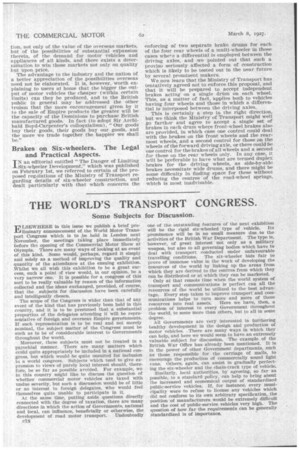THE WORLD'S TRANSPORT CONGRESS.
Page 40

Page 41

If you've noticed an error in this article please click here to report it so we can fix it.
Some Subjects for Discussion.
LSEWHERE in this issue we publish a brief pre liminary announcement of. the World Motor Transport Congress which is to be held in London next November, the meetings taking place immediately before the opening of the Commercial Motor Show at Olympia. There are many ways of looking at an event of this kind. Some would, perhaps, regard it simply and solely as a method of improving the quality and quantity of the attendance at the ensuing exhibition. Whilst we all wish this exhibition to be a great success, such a point af view would, in our opinion, be a very narrow one. It is possible for a congress of this sort to be really valuable by reason of the information collected and the ideas exchanged, provided, of course, that the subjects for discussion have been carefully and intelligently chosen.
The scope of the Congress is wider than that of any event of the kind that has previously been held in this country, and it is to be presumed that a substantial proportion of the delegates attending it will be representative of foreign and overseas Empire governments. If such representation is to be real and not merely nominal, the subject matter of the Congress must be such as to be of considerable interest to Governments throughout the world.
Moreover, these subjects must not be treated in a parochial manner. There are many matters which could quite appropriately be included in a national congress, but which would be quite unsuited for inclusion in a world congress. Subjects which tend to give expression to views of purely local interest should, therefore, be so far as possible avoided. For example, we in this country might like to discuss the question of whether commerciar motor vehicles are taxed with undue severity, but such a discussion would be of little or no interest to foreign delegates, who would feel themselves quite unable to participate in it.
At the same time, putting aside questions directly connected with the degree of taxation, there are many directions in which the action of Governments, national and local, can influence, beneficially or otherwise, the development of road motor transport. Undoubtedly e18
one of the outstanding features of the next exhibition will be the rigid six-wheeled type a vehicle. Its prominence will be in no small measure due to the activities of the British War Department. The type is, however, of great interest not only as a military weapon, but also to all governing bodies which have to deal with transport conducted under unfavourable travelling conditions. The six-wheeler bids fair to prove of immense value in the work of developing the resources of the world by linking up the areas from which they are derived to the centres from which they can be distributed or at which they can be marketed.
Only at that remote time when the world system of transport and communications is perfect can all the resources of the world be utilized to the best advantage. Every step taken to improve transport and communications helps to turn more and more of these resources into real assets. Here we have, then, a problem of interest to every Governmentthroughout the world, to some more than others, but to all in some degree.
An Governments are very interested in furthering healthy development in the design and production of motor vehicles. .There are many ways in which they can help, and here we would seem to have an extremely valuable subject for discussion. The example of the British War Office has already been mentioned. It is in the power of other Government departments, such as those responsible for the carriage of mails, to encourage the production of commercially sound light vans. Others, again, can assist in gradually perfecting the six-wheeler and the chain-track type of vehicle.
Similarly, local authorities, by agreeing, so far as possible, to a standard policy, can help to bring about the increased and economical output of standardized public-service vehicles. If, for instance, every municipality were to refuse to license any vehicles which did not conform to its own arbitrary specification, the position of manufacturers would be extremely difficult and the cost of public-service vehicles very high. The question of how far the requirements can be generally standardized is of Importance. We all know that the efficiency of road transport is dependent upon the adequacy both of the available vehicles and of the available roads: The better the road the more economically can the vehicle be operated. The subject of road improvement, viewed from this standpoint, might therefore be very advantageously considered by a world congress.
The discussion of many other important questions is well worth considering, but for the moment we will content ourselves with mentioning only one of these, that is to say, the big problem of the proper co-ordination of road and rail transport and the reasonable regulation of competition between the two, so far as such regulation would be in the interests of the public and would depend on provisions of a completely equitable character. We hope that some at least of the matters on which we have briefly touched will be made subjects of discussion by the Congress, which 'will then, in our opinion, be doing really useful work which might have lasting and valuable consequences.












































































































